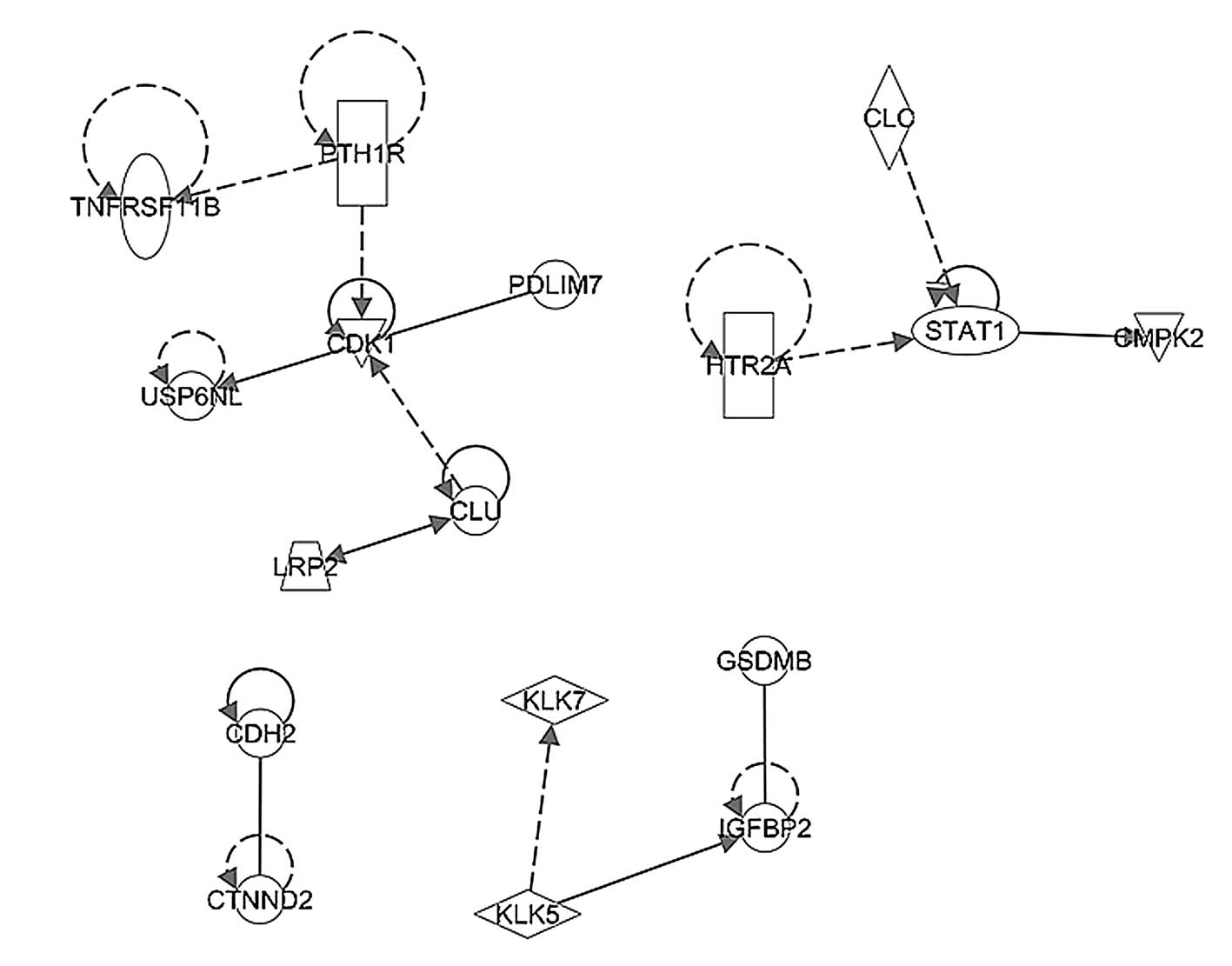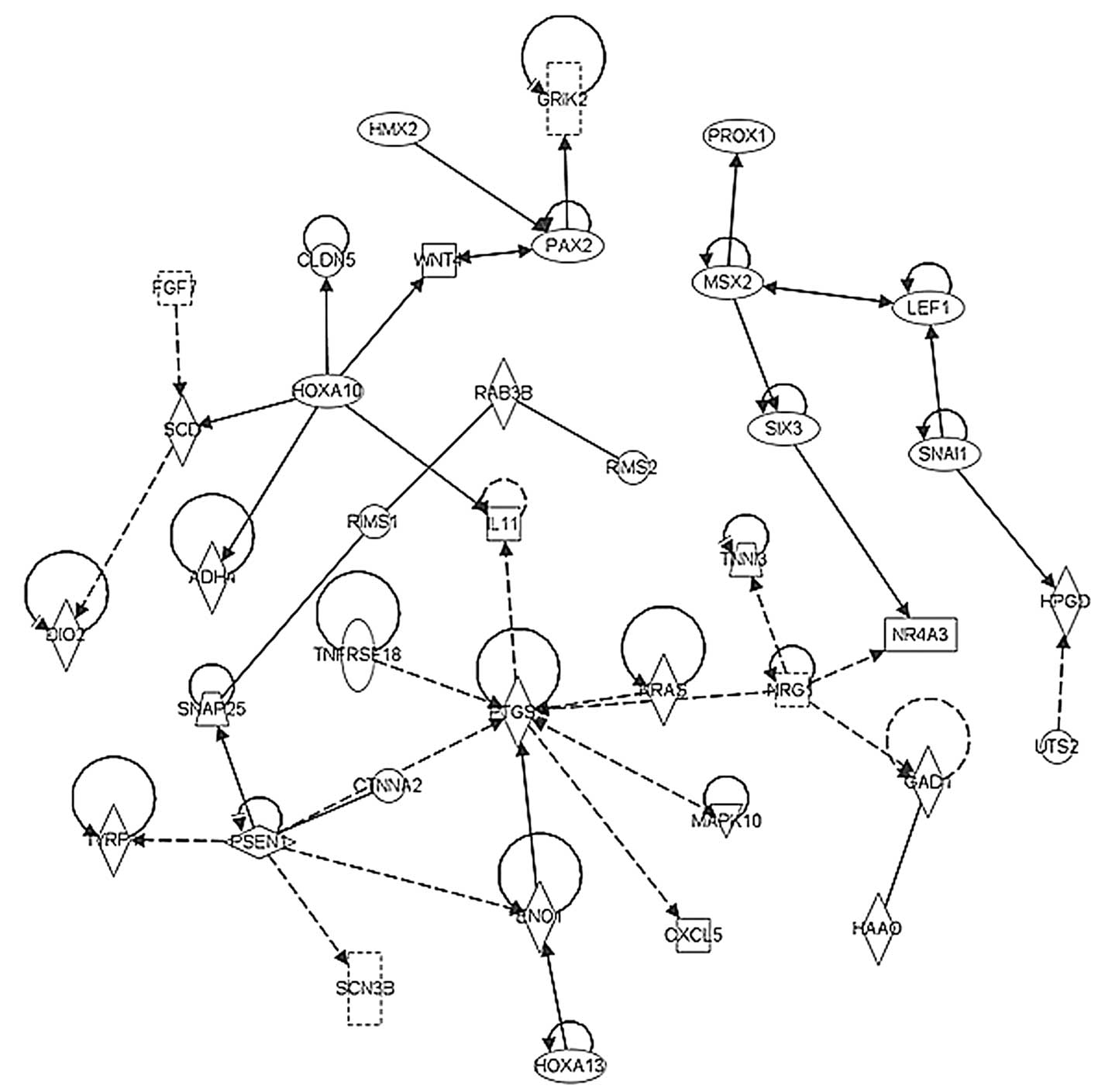|
1
|
Lin YS, Jen YM, Wang BB, Lee JC and Kang
BH: Epidemiology of oral cavity cancer in taiwan with emphasis on
the role of betel nut chewing. ORL J Otorhinolaryngol Relat Spec.
67:230–236. 2005. View Article : Google Scholar : PubMed/NCBI
|
|
2
|
DeSantis C, Siegel R, Bandi P and Jemal A:
Breast cancer statistics, 2011. CA Cancer J Clin. 61:409–418. 2011.
View Article : Google Scholar : PubMed/NCBI
|
|
3
|
Slamon DJ, Clark GM, Wong SG, Levin WJ,
Ullrich A and McGuire WL: Human breast cancer: Correlation of
relapse and survival with amplification of the HER-2/neu oncogene.
Science. 235:177–182. 1987. View Article : Google Scholar : PubMed/NCBI
|
|
4
|
Gradishar WJ: Tamoxifen-what next?
Oncologist. 9:378–384. 2004. View Article : Google Scholar
|
|
5
|
Yamamoto Y and Iwase H:
Clinicopathological features and treatment strategy for
triple-negative breast cancer. Int J Clin Oncol. 15:341–351. 2010.
View Article : Google Scholar : PubMed/NCBI
|
|
6
|
Podo F, Buydens LM, Degani H, Hilhorst R,
Klipp E, Gribbestad IS, Van Huffel S, van Laarhoven HW, Luts J,
Monleon D, et al: Triple-negative breast cancer: Present challenges
and new perspectives. Mol Oncol. 4:209–229. 2010. View Article : Google Scholar : PubMed/NCBI
|
|
7
|
O'Shaughnessy J, Osborne C, Pippen JE,
Yoffe M, Patt D, Rocha C, Koo IC, Sherman BM and Bradley C:
Iniparib plus chemotherapy in metastatic triple-negative breast
cancer. N Engl J Med. 364:205–214. 2011. View Article : Google Scholar : PubMed/NCBI
|
|
8
|
Perou CM, Sørlie T, Eisen MB, van de Rijn
M, Jeffrey SS, Rees CA, Pollack JR, Ross DT, Johnsen H, Akslen LA,
et al: Molecular portraits of human breast tumours. Nature.
406:747–752. 2000. View
Article : Google Scholar : PubMed/NCBI
|
|
9
|
Mohamed A, Krajewski K, Cakar B and Ma CX:
Targeted therapy for breast cancer. Am J Pathol. 183:1096–1112.
2013. View Article : Google Scholar : PubMed/NCBI
|
|
10
|
Thike AA, Yong-Zheng Chong L, Cheok PY, Li
HH, Wai-Cheong Yip G, Huat Bay B, Tse GM, Iqbal J and Tan PH: Loss
of androgen receptor expression predicts early recurrence in
triple-negative and basal-like breast cancer. Mod Pathol.
27:352–360. 2014.
|
|
11
|
Chen LH, Kuo WH, Tsai MH, Chen PC, Hsiao
CK, Chuang EY, Chang LY, Hsieh FJ, Lai LC and Chang KJ:
Identification of prognostic genes for recurrent risk prediction in
triple negative breast cancer patients in Taiwan. PLoS One.
6:e282222011. View Article : Google Scholar : PubMed/NCBI
|
|
12
|
Hicks C, Kumar R, Pannuti A, Backus K,
Brown A, Monico J and Miele L: An integrative genomics approach for
associating GWAS information with triple-negative breast cancer.
Cancer Inform. 12:1–20. 2013. View Article : Google Scholar : PubMed/NCBI
|
|
13
|
Kuo WH, Chang YY, Lai LC, Tsai MH, Hsiao
CK, Chang KJ and Chuang EY: Molecular characteristics and
metastasis predictor genes of triple-negative breast cancer: A
clinical study of triple-negative breast carcinomas. PLoS One.
7:e458312012. View Article : Google Scholar : PubMed/NCBI
|
|
14
|
Sotiriou C and Pusztai L: Gene-expression
signatures in breast cancer. N Engl J Med. 360:790–800. 2009.
View Article : Google Scholar : PubMed/NCBI
|
|
15
|
Kreike B, van Kouwenhove M, Horlings H,
Weigelt B, Peterse H, Bartelink H and van de Vijver MJ: Gene
expression profiling and histopathological characterization of
triple-negative/basal-like breast carcinomas. Breast Cancer Res.
9:R652007. View
Article : Google Scholar : PubMed/NCBI
|
|
16
|
Peppercorn J, Perou CM and Carey LA:
Molecular subtypes in breast cancer evaluation and management:
divide and conquer. Cancer Invest. 26:1–10. 2008. View Article : Google Scholar : PubMed/NCBI
|
|
17
|
Kurebayashi J, Moriya T, Ishida T,
Hirakawa H, Kurosumi M, Akiyama F, Kinoshita T, Takei H, Takahashi
K and Ikeda M: The prevalence of intrinsic subtypes and prognosis
in breast cancer patients of different races. Breast. 16(Suppl 2):
S72–S77. 2007. View Article : Google Scholar : PubMed/NCBI
|
|
18
|
Weigelt B, Baehner FL and Reis-Filho JS:
The contribution of gene expression profiling to breast cancer
classification, prognostication and prediction: A retrospective of
the last decade. J Pathol. 220:263–280. 2010.
|
|
19
|
Rodenhiser DI, Andrews JD, Vandenberg TA
and Chambers AF: Gene signatures of breast cancer progression and
metastasis. Breast Cancer Res. 13:2012011. View Article : Google Scholar : PubMed/NCBI
|
|
20
|
Zavadil J and Böttinger EP: TGF-beta and
epithelial-to-mesenchymal transitions. Oncogene. 24:5764–5774.
2005. View Article : Google Scholar : PubMed/NCBI
|
|
21
|
Liu Y, Teige I, Birnir B and
Issazadeh-Navikas S: Neuron-mediated generation of regulatory T
cells from encephalitogenic T cells suppresses EAE. Nat Med.
12:518–525. 2006. View
Article : Google Scholar : PubMed/NCBI
|
|
22
|
Untch M, Gerber B, Harbeck N, et al: 13th
st Gallen international breast cancer conference 2013: primary
therapy of early breast cancer evidence, controversies, consensus -
opinion of a german team of experts (zurich 2013). Breast Care
(Basel). 8:221–229. 2013.
|
|
23
|
Hudis CA and Gianni L: Triple-negative
breast cancer: An unmet medical need. Oncologist. 16(Suppl 1):
1–11. 2011. View Article : Google Scholar : PubMed/NCBI
|





















